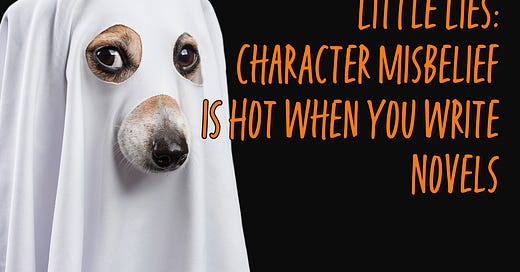Tell Me Lies, Tell Me Sweet Little Lies: Character Misbelief is Hot When You Write Novels
Write Better Now/Dogs Are Smarter Than People Podcast
So far we’ve talked (and written) twice about character misbeliefs. Then we took a baby break because we’re like that, but we’re back on it now, my friends.
Those earlier posts are linked below.
First off to recap, the big lie or character misbelief in your story is what motivates them or causes them to act in a certain way. If your character grows in a positive way, during the story, they usually realize by the end that the lie was a big ole lie and not a glorious simple truth and voila—life is better.
Your lie has to move the plot forward and it has to relate to your story’s theme.
According to LitCharts, theme is just “a universal idea, lesson, or message explored throughout a work of literature.”
So a character lie is something like “MIGHT MAKES RIGHT” because your character believes this with all their mighty heart. The theme might be love is more powerful than might. Often, the theme disproves the lie, right?
Cool.
Now, when you’re building characters for your novel and building the plot around them, you want to use that theme and that lie to make your story resonate, to make your readers or audience feel for the characters involved and root for them to stop lying to themselves and get some wisdom (in the form of the story’s theme).
So basically, you find the theme and the opposite (kind of tweaked) is usually the character’s misbelief.
So, here’s how it goes, step by step for those of you who like steps:
Figure out the theme.
Think of what’s the opposite of the truth of that theme (the lie).
Think about why your main character believes this hideous lie.
Write a little scene about it. Call it backstory. Think deeply about whether it actually needs to be in the story AS SCENE or if it can be sprinkled in.
Think about other moments that made your poor honey of character believe this BS.
Think about how believing this lie has totally messed up your character’s life right now in the story.
Figure out if your main (character) does something that they think sparks joy because of this BS lie but they are totally wrong?
How does your character go after a goal that deals with the lie or the theme? This is the plot of your book.
Cool, right?
DOG TIP FOR LIFE
Every once in awhile reassess the things you believe about yourself and the world. Are they really true? Why do you even believe them?
What’s the theme of your life? It sounds like we’ve had some Mary Jane, but seriously, as Kira Newman at the Greater Good asks,
“If your life were a movie, where would the plot be headed right now?
“You may not be immortalized in film anytime soon, but your life is still a story. According to psychologists, we all have an internalized narrative that explains how we became the person we are today and where we are headed tomorrow. Like any Hollywood blockbuster, this narrative has settings, scenes, a plot, characters, and themes.”
WRITING TIP OF THE POD
A lot of books are flat not because they aren’t clever or the plot doesn’t have cool things. They are flat because the characters are. The characters are often flat because there’s no big lie that’s part of their motivation.
PLACE TO SUBMIT
Exploration and Recovery: Mental Illness and The Awakenings Review
Year-round
“The Awakenings Review is an award-winning literary magazine committed to publishing poetry, short stories, nonfiction, and photography by writers, poets, and artists who write from experience with mental illness: either in themselves, family members, or friends. Located in the Chicago area but international in scope, our print publication is one of the nation’s leading journals of this genre. By its nature, mental illness is a troubling, distressing, and painful experience. At The Awakenings Review we love to get works of renewal and healing, a positive outcome to your suffering and distress. We are currently accepting submissions for our Spring 2024 issue. Please read our submission guidelines at www.AwakeningsProject.org.”
RANDOM EXERCISE FOR THEME
Over on the Reedsy blog, there is a post about finding your novel’s theme. You can read it in full over there, but we’re going to encapsulate it here:
Write nouns that deal with your novel. Hobbits. Friendship. Powerful ring. Hot elves.
Pick one to be your center noun. Power.
Make a thematic statement with that theme. Absolute power corrupts absolutely.
THOSE LINKS I WAS TALKING ABOUT
MORE LINKS TO HELP YOU OUT
https://jamigold.com/2013/09/what-do-your-characters-falsely-believe/
https://www.helpingwritersbecomeauthors.com/2-different-types-of-lie-your-character-believes/
https://writershelpingwriters.net/2018/04/the-destructive-power-of-the-lie-your-character-believes/






